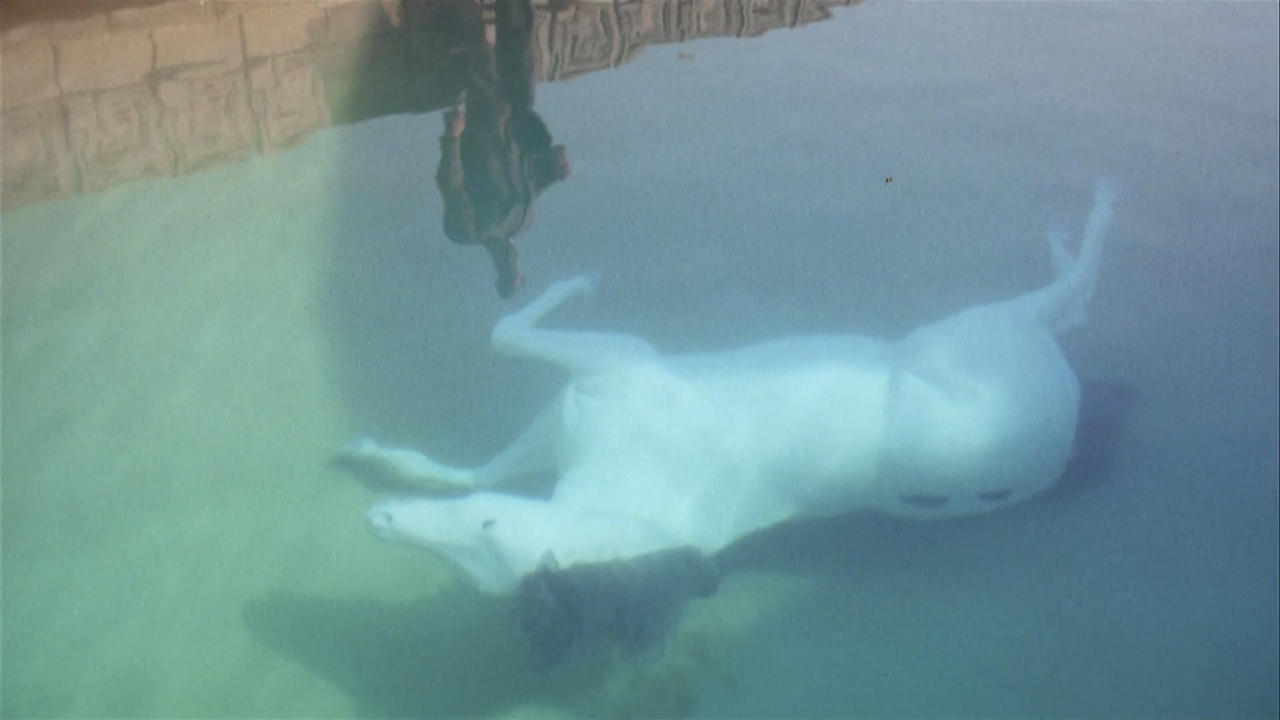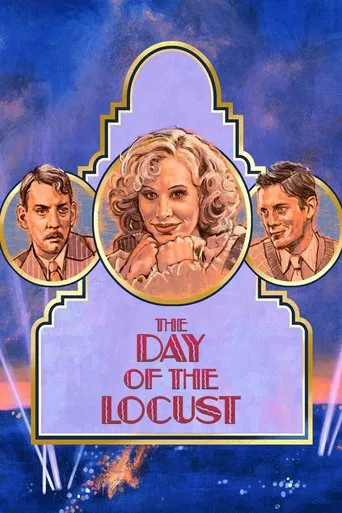

It's late 30's Hollywood. Hitler may be marching in Europe but it's the desperate insular lives of people trying to make it in Lalaland. Faye Greener (Karen Black) is trying every way to make it as an actress. Her quiet neighbor Homer Simpson (Donald Sutherland) is desperately in love with her and she takes advantage. Tod Hackett (William Atherton) is a production designer working on a movie about Waterloo and he's even more desperately in love with Faye. Then her drunken former vaudeville father Harry Greener (Burgess Meredith) arrives.This is an epic of Hollywood excesses and the desperation for fame. It would be more compelling if it could concentrate and pinpoint the story. It becomes too scattered and too meandering. It could have focused in on Faye's journey and stayed with her smaller personal story. The final act goes crazy and I'm not sure if it works. I'm also not sure what the book is like. This has some interesting scenes and interesting aspects. It doesn't all work.
... View MoreNathanael West's novel is brought to the screen by director John Schlesinger as William Atherton plays art director Tod Hacket in 1930's Hollywood, where he becomes attracted to actress Faye Greener(Karen Black) who is burdened with an alcoholic father(Burgess Meredith) and the unrequited love of Homer Simpson(Donald Sutherland, very sympathetic in an excellent, heart-breaking performance). Tod does what he can to win her love, but she is determined to make it as an actress, and marry a rich & handsome man. Events will spiral out of control by the end, and all dreams will be shattered...Deeply & profoundly depressing, cynical film about disappointment and disillusionment paints a notably ugly portrait of Hollywood at that time. Though the acting is fine, and script ambitious, even thoughtful, film comes perilously close to self-destructing, with the devastating climax that is so over the top visually, it's funny, though viewer is too horrified to utter a sound! A shame, but grim, hopeless film is a misfire, though again, Donald Sutherland saves the film from ruin, giving one of the most authentic and believable portraits of loneliness, frustration, and despair ever captured in cinema, a true tragic character.
... View MoreYou could write a whole book on the topic, "Movies About Movie-Making" – indeed Rudy Behlmer and Tony Thomas did just that with their Hollywood's Hollywood back in 1979. For this movie, they give a rave review. However , I disagree. Even though it is superbly photographed and set, I would describe Day of the Locust as an over-rated, pretentious, and disappointing production. Admittedly, Burgess Meredith , brilliant actor that he is, adds some zing to the turgid goings-on , but, aside from William Castle's curiosity-value brief appearance as the Waterloo movie director and the spectacularly staged "accident" on that set, the movie tends to out-stay its welcome. Donald Sutherland is a drag and some sequences like the cock-fighting episode (which doesn't figure in the book at all) could well be eliminated to tighten the very meandering, self-indulgent plot. Paul Stewart in an all-too-brief scene as the Zanuck-style studio head, plus Black and Atherton are mildly effective. The precocious brat of a kid is also very credible, but the film's longueurs and its arty climax destroy pace, illusion – and believability.
... View MoreJohn Schlesinger's film of Nathanial West's iconic novel Day of the Locust has been hanging in there with film buffs for so long I think it is about time it was acknowledged as the minor masterpiece that it is. Maybe not so minor in fact. When I watch it, which I've been doing since the day it was released, I find myself wishing Hitchcock or Welles had directed an adaptation of it, something that would have insured its arrival into the pantheon of masterpieces. This isn't to degrade Schlesinger's work at all but I think the Hitchock or Wellesian touch might have made it into a film as much talked about as Sunset Boulevard. Day of the Locust is not simply another Hollywood exposé along the lines of Sunset Boulevard, A Star is Born and The Bad and the Beautiful, but it is every bit as fascinating and gut wrenching, perhaps more so, than those classics. Nathanial West's tale is a full blown horror story. Hollywood itself is the inanimate monster that evokes the beast in the bedazzled humans that inhabit the landscape. ALL are victims of the mind numbing, soul evaporating environment. The ironic and disheartening thing about this story is that West has used Love as the vehicle that speeds its passengers towards their melancholy doom. The most sympathetic character is Homer Simpson, yes, Homer Simpson, played with a quiet and tortured passion by Donald Sutherland. Homer is a meek, virginal certified public account who fate has thrown in the path of Faye Greener (Karen Black) and her down-at-heel father Harry (Burgess Meredith in a terrifying performance of pathos and madness), an ex- vaudevillian who has ended up in Hollywood after arriving their years before for a small part in a B movie. Tod (William Atherton) is a bright young man newly arrived from Yale. He is a gifted artist and spends his time recording in drawings the people and events he witnesses. He is rapidly sucked into the vortex of despair and barely escapes with his life in the end. Homer, on the other hand, is not so lucky. The final scenes are harrowing. The most shocking effect it had on me is that I found myself rooting for the crazed Homer who does something I can't bring myself to reveal because the shock of it is worth discovering for oneself. It involves the comeuppance of a horrid child actor named Adore (its sex is ambiguous) played with infuriating moxie by the young Jackie Haley.The cast is splendid. Geraldine Page makes an atomic blast of an appearance as the charlatan evangelist Aimee Sempel McPherson in a single scene of insane religious hysteria.Day of the Locust is about our atavistic need for gods and the subsequent need to destroy them for not living up to our delusions of ourselves. It is a truly disturbing and fascinating film and should be seen by all lovers of great film adaptations of great booksThe 1970s and early 1980s were a Golden Age in Hollywood that is just now being acknowledged as such. The Day of the Locust is one film from that era that rests comfortably near the top of the pyramid. Don't miss it.Very highly recommended.
... View More